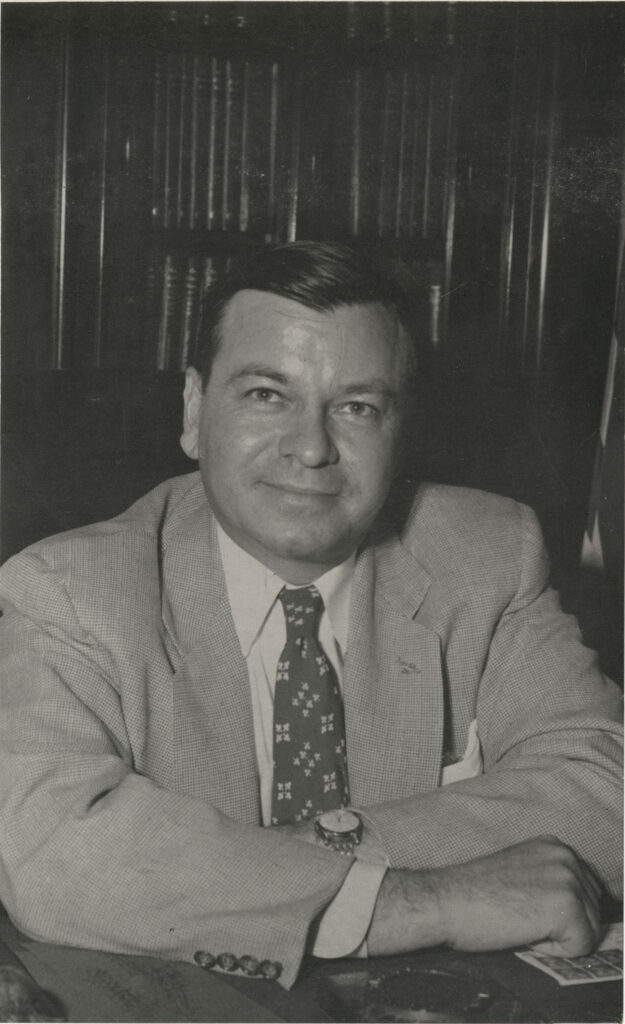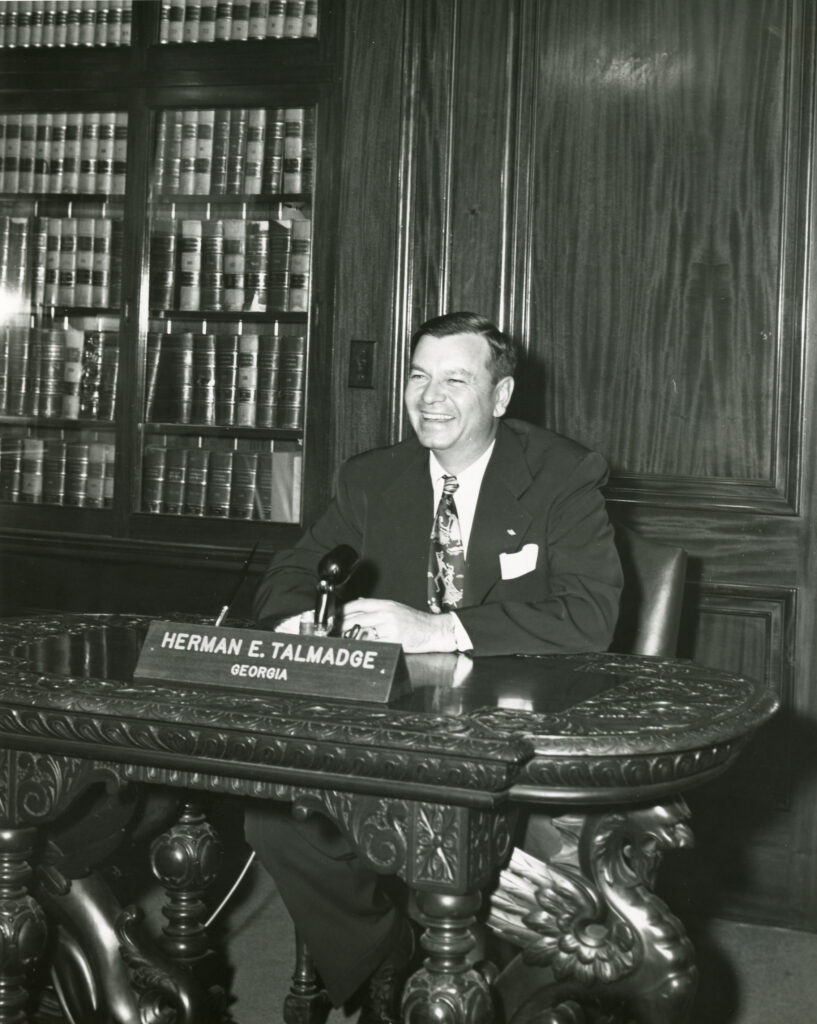What Issue Revitalized Talmadge Supporters and Eugene Talmadge to Run Again for Governor in 1946?
Georgia'due south "iii governors controversy" of 1946-47, which began with the decease of governor-elect Eugene Talmadge, was one of the more baroque political spectacles in the annals of American politics.
In the wake of Talmadge's decease, his supporters proposed a plan that immune the Georgia legislature to elect a governor in January 1947. When the General Assembly elected Talmadge's son Herman Talmadge equally governor, the newly elected lieutenant governor, Melvin E. Thompson, claimed the office of governor, and the outgoing governor, Ellis Arnall, refused to go out office. Eventually, the Georgia Supreme Court settled the controversy.
Background
In the summer of 1946 Eugene Talmadge won the Democratic primary for governor for the 4th fourth dimension. His election was assured because the Republican Party in Georgia was not viable and had no nominee. Nevertheless, Talmadge was not healthy, and his close friends began to fright that he would non live until the November full general election or would die before his inauguration in Jan 1947.
After a bang-up deal of legal enquiry, Talmadge's followers constitute dubious constitutional and statutory precedence for the state legislature's electing a governor if the governor-elect died earlier taking part. According to their findings, the General Assembly could choose betwixt the 2nd- and third-place vote-getters from the general ballot. Because no Republican candidate would exist running, the Talmadge forces reasoned that a write-in candidate with enough votes statewide would be second or tertiary behind Talmadge, and the General Associates could choose that candidate if the situation warranted. The Talmadge stalwarts therefore chose to run Talmadge's son, Herman, as a undercover write-in candidate.

There was one problem with this plan: the new country constitution created the office of lieutenant governor, which would be filled for the start time in the 1946 election. The lieutenant governor would go chief executive if the governor died in part. The constitution was not articulate near whether the lieutenant governor–elect would succeed if the governor-elect died before he took the oath of part. Melvin East. Thompson, a fellow member of the anti-Talmadge camp, was elected lieutenant governor in 1946. Naturally, the Talmadge forces were not eager for Thompson to become the next governor.
Two Claimants
Eugene Talmadge died in late Dec 1946. When the Full general Assembly convened in Jan 1947, the firsthand guild of business was to fill the vacant governorship. The Talmadge forces wanted the legislature to elect Herman Talmadge, while Thompson's allies lobbied the legislature to declare Thompson the governor. Co-ordinate to the state constitution, ballot results were not official until certified by the General Assembly. Thompson wanted the Full general Assembly to certify the returns then that, as the official lieutenant governor–elect, he would accept a stronger claim to the governorship. Talmadge forces, notwithstanding, won a close vote to delay certifying the vote and to movement immediately to select a new governor. On Jan 15, 1947, the General Assembly elected Herman Talmadge as governor. Meanwhile, Thompson began legal proceedings to appeal to the Georgia Supreme Court.

The Tertiary Claimant
Every bit the legislature was electing Herman Talmadge governor and Thompson was preparing a courtroom fight to dispute Talmadge'south election, the outgoing governor, Ellis Arnall, announced that he would not relinquish the function until it was clear who the new governor was. Arnall's deportment galvanized Talmadge'southward supporters, who bitterly hated his anti-Talmadge policies. The legislature's election of Talmadge provoked a confrontation betwixt the Talmadge and Arnall camps. Although the two politicians maintained their decorum, fistfights broke out among their followers.
Talmadge asked Arnall to honor the Full general Assembly'due south ballot. Arnall maintained that the legislature had no correct to elect a governor and refused to step aside. Talmadge and so ordered country troopers to remove Arnall from the capitol and run into that he returned dwelling safely. On January 15, the day of the legislative election, both Herman Talmadge and Ellis Arnall claimed to be governor of Georgia and shared the same offices in the capitol. Past the next day Talmadge had seized control of the governor's office and had the locks on the doors inverse. Arnall continued to maintain his position as governor and fifty-fifty ready a governor's office in exile in an information kiosk in the capitol. Ultimately, Arnall relinquished his claim as governor and supported Thompson.
An Anticlimactic Ending
Subsequently Arnall surrendered his merits to the governorship, Georgia was still left with two governors, each of whom had appointed regime officials. The result was 2 months of chaos. Although both politicians laid claim to the governorship, neither could sign legislation or acquit out official deportment because the great seal of Georgia had been subconscious by the secretary of state, Ben Fortson, who tucked the seal under the cushion of his wheelchair, where it would remain until the courtroom rendered its verdict.
In March 1947 the Georgia Supreme Courtroom ruled that Melvin E. Thompson was the rightful governor because he was lieutenant governor–elect when Eugene Talmadge died. In a five-to-two decision the justices ruled that Thompson would be the acting governor until a special election could be held to decide the remainder of the original term, which would take run from 1947 to 1951. Within two hours of the court decision, Herman Talmadge left the governor's role. His apparent capitulation surprised many who thought that he might claiming the ruling. Almost immediately he began candidature for the special ballot in September 1948.
In hindsight, the controversy seems almost comical, a relic of an era of Georgia politics that is long dead. At the fourth dimension, notwithstanding, it was a source of neat embarrassment for business leaders of the state. Georgia's national reputation, already unsavory, took an even further accident. Moreover, the episode had several far-reaching consequences. First, it strengthened Herman Talmadge's political reputation. His handling of the courtroom decision earned him a great bargain of respect among younger voters and returning Earth War II (1941-45) veterans. Hard-core Eugene Talmadge supporters, the "wool hat boys," flocked to immature Herman because of their perception that the anti-Talmadge forces had stolen the election. The events of 1946-48 too marked the last gasp of the anti-Talmadge faction. Afterwards Herman Talmadge's easy victory over Thompson in 1948, no avowed member of that faction ever occupied the governor's part again.

Source: https://www.georgiaencyclopedia.org/articles/government-politics/three-governors-controversy/
0 Response to "What Issue Revitalized Talmadge Supporters and Eugene Talmadge to Run Again for Governor in 1946?"
Post a Comment